Perihelion Summer Read online
Begin Reading
Table of Contents
About the Author
Copyright Page
The author and publisher have provided this e-book to you without Digital Rights Management software (DRM) applied so that you can enjoy reading it on your personal devices. This e-book is for your personal use only. You may not print or post this e-book, or make this e-book publicly available in any way. You may not copy, reproduce or upload this e-book, other than to read it on one of your personal devices.
Copyright infringement is against the law. If you believe the copy of this e-book you are reading infringes on the author's copyright, please notify the publisher at: http://us.macmillanusa.com/piracy.
PART ONE
1
Matt’s parents threw a party for New Year’s Eve, filling the house and garden with people and food, music and liquor. His mother had sent invitations to the rest of the crew, but Matt knew that on their last night before departing they’d choose to be with their own families instead, so he was left with the company of relatives and acquaintances who all believed that he’d lost his mind.
It was a sweltering night, and even in the yard the floodlights obliterated any trace of the stars and left him claustrophobic. Most people were polite to his face, though when he saw them watching out of the corner of his eye, some looked dismayed, as if he’d joined an apocalyptic death cult and was on his way to Heaven’s Gate, while others were smirking with what he supposed was condescending amusement at the absurdity of his actions.
As the night wore on, some guests became less inhibited. “How many years did you work on Greater Sunrise?” Matt’s cousin Leo demanded, cornering him beside the barbecue.
“Five,” Matt replied.
“Fly-in, fly-out?”
“Yes. Six weeks on, two weeks off.”
“For what? Two hundred grand a year?”
“That’s what I was getting at the end,” Matt conceded. “Before tax.”
“Two hundred grand, for working on the rigs! Straight out of university!”
“No,” Matt corrected him. “There was a two-year traineeship first. On about one-fifth the salary.”
Leo was undeterred. “You could have bought a house! Or at least put down a deposit!”
“Probably.”
“But now you’re off for a cruise in the SS Sunk Costs, just to make us all believe it was worth it.”
Matt wasn’t sure why his cousin was quite so affronted by the way he’d spent his money, unless he subscribed to some kind of Tinker Bell effect whereby the mere act of investing in real estate served as a show of faith that would help render everyone’s bricks and mortar invulnerable.
He said, “We’ll be testing out a form of aquaculture that could help a lot of people. I think that’s worth all the time and money we’ve put into it, regardless.”
“Regardless?” Leo snickered. “So when you’re back here in six months, and the sky hasn’t fallen, you can pretend you’ve saved face because it was all about world hunger?”
Matt said, “Nothing would make me happier than being able to come back.”
“You’re drunk, Leo. Go and lie down.” Matt turned; his sister Selena was standing beside him.
Leo opened his mouth to protest, but Selena gazed back at him sternly and he walked away without another word.
“How do you do that?” Matt marveled.
“Unwavering self-belief,” she replied. “It only lasts twenty seconds at a time, but that’s long enough for most purposes.”
Matt was tongue-tied for a moment. Then he said, “The invitation still stands. Bring Mum and Dad if you can talk them into it—and I know you could, if you used your lawyer’s superpowers.”
Selena smiled. “You really think we’re doomed here?” She spoke without a trace of sarcasm, but also without a trace of fear.
Matt framed his reply carefully, struggling to find the right balance between overselling the risk and talking it down. “On the Mandjet, we’ll be self-sufficient in food, and pretty much immune to sea-level changes. So why not take advantage of that, if you have a choice?”
Selena said, “I live on high ground. I have solar panels, a rainwater tank, and enough food in the freezer to last a year.”
“I think you’re exaggerating the size of your freezer.”
“There’s a lot of dry pasta in the pantry as well.”
Matt tried pushing harder. “If the ocean rises fifty meters in a day, and the high-tide mark is twenty kilometers inland, will you still be glad you stayed put?”
Selena shook her head. “No. But most of the experts think the chances are good that Taraxippus won’t come close enough to make any difference at all.”
“That’s true.” Matt laughed, sick to his stomach at the realization that he was almost certainly powerless to sway her. He was already so accustomed to the particular kind of austerity he was about to face that another few months surrounded by ocean, with limited privacy, rudimentary hygiene and multiple sources of unpleasant odors seemed like a perfectly fair price to pay against odds of five-hundred-to-one that it would turn out to be a life-or-death decision. But if he’d spent the last few years in oak-paneled offices and a comfortable suburban home, the idea of being cooped up on a floating fish farm just to better his prospects in an unlikely apocalypse would probably have struck him as disproportionate, if not actually deranged.
He said, “The error bars might shrink over the next few weeks. If you change your mind, we won’t be too far off the coast. Say the word, and I’ll find a way for you to join us.”
“Okay.” Selena managed to sound entirely sincere, without conceding the slightest possibility of any of these things happening.
She reached out and embraced him. “Just keep yourself safe,” she said. “Even in the best of times, nothing’s unsinkable.”
2
Matt met Arun at the marina and they set off for the Mandjet in the runabout. The swell was about three meters, but there was almost no wind, and once they were out on the open water the waves were glassy, rolling in every ten or twelve seconds, leaving the boat rising and falling like a fairground ride stuck in a time loop.
“Are you as hungover as you look?” Arun asked, shouting over the noise of the outboard. He had yet to remove his own sunglasses, but then, it was a bright morning.
Matt said, “I didn’t drink much. But I didn’t get much sleep. How was your send-off?”
“My mother wouldn’t stop crying.”
“She thinks she won’t see you again?”
“No, she thinks I’ve made myself a laughingstock and I’ll never work again.”
“Okay.” Matt didn’t know what more they could have done to distance themselves from the crackpots, who believed that the encounter was a fait accompli predicted by the Mayans or the Babylonians, and orchestrated in fine detail by malevolent aliens. His team had never disputed the astronomers’ claims about the distribution of possible trajectories for the black hole; why would they, when every observation was on the public record, and anyone with a computer and a grasp of undergraduate physics could verify the whole analysis for themselves? In any case, the Mandjet was a perfectly respectable venture that was worth pursuing for a dozen different reasons—and when they’d shared the design on the internet, they hadn’t included one word about Taraxippus. “We can’t win,” he decided.
Arun grinned, his dark lenses glinting. “Not unless it goes badly on land.”
Matt’s skin crawled. “Don’t say that.”
“So now you’re getting superstitious about what we say?”
“No. But if we joke about it, and it happens, won’t you feel bad?”
“Not for joking about it,” Arun insisted. “I’ll feel bad for not
feeding my family sleeping pills and dragging them out here against their will.”
Matt glanced at the brown cloth sack on the floor of the boat, but it wasn’t really large enough even for Arun’s youngest sister.
He checked the GPS, then turned the motor a little to correct their course. After a few minutes, each time the waves lifted the runabout he could see the glint of sunlight off the Mandjet’s solar panels, and before long the bright flashes were joined by glimpses of orange fiberglass. The broad ring of linked pontoons was draped over the undulating surface of the water like a Dali clock; one unkind online commenter had described the vessel as “flotsam that hadn’t yet had time to disperse.” But the more the individual segments seesawed up and down beside their neighbors, the more power they generated in the links. “Let’s see you do that with a pile of floating steamer trunks,” Arun had replied.
As they drew up beside the docking pen, Matt saw the second runabout in place, which meant Yuki and Jožka were already on board. He maneuvered the boat into the pen and then the two of them each took a line and jumped onto the dock. The runabout pulled away, but Arun already had his line snagged on a cleat, and between them it only took a couple of minutes to get the thing secured. Matt walked around and closed the gate of the pen, then returned to find Arun shouldering his mysterious sack.
Matt grabbed his own, much smaller backpack. “Should I even ask what’s in that?”
Arun shook the sack gently; Matt heard tins and glass clanking. “One of my aunts insisted on offering her idea of suitable provisions, and I didn’t have the heart to refuse.”
“No harm in that. There’s more to life than cobia.”
Arun grunted in reluctant assent. “A clean break might have been easier, though. There I was, reconciled to an indefinite abstinence from mango chutney, and now I have to start wondering all over again what it will feel like when the supply runs out.”
They climbed the ladder to the deck. Matt glanced down into the enclosed circle of water—though short of a mass die-off or a sudden algal bloom, nothing on the surface was likely to reveal any clues about the health of the passengers below. “No shark fins,” he noted.
Arun took off his sunglasses and regarded him with horror. “So we can joke about that?”
“Sure, if by ‘we’ you mean anyone who volunteers to help me fix holes in the net.”
They reached one of the links just as the footbridge spanning the gap above the pivot was starting to lengthen. While the extra meter or so of supporting rods and safety rails emerged from the housings for the pumps they were driving, the deck of the bridge simply concertinaed out, its tiny flexing parallelograms tickling the soles of Matt’s feet.
As they rounded the corner, Matt saw a pale young man leaning over the rail, vomiting a yolk-yellow stream into the Indian Ocean.
“Do you know who that is?” he asked Arun.
“No idea.”
“It’s not Jožka’s brother?”
“I don’t think so.”
Yuki emerged from her cabin and put an arm tenderly across the man’s shoulders. She spotted her two friends approaching and frowned, as if they were intruding on a private moment, before turning back to the ailing man.
Matt stopped walking. “Did you know she had a new boyfriend?”
“No. I’m not in the loop; you’re the one who told me when she broke up with what’s-his-name.”
Matt looked away from the couple, trying to suppress his sense of disquiet. They were all entitled to bring as many companions as the Mandjet could feed and house; that was the whole point of the venture. And if he’d managed to persuade Selena to join him, she’d certainly be throwing up about now. But even if his friends only knew his sister slightly, they knew he could vouch for her. How long had Yuki known this man?
The man wiped his mouth with the back of his hand, and the two of them reentered the cabin.
Matt looked to Arun for guidance. “So do we go and introduce ourselves, or wait until he stops barfing?”
Arun said, “I think it would be rude to wait that long.”
When they reached the entrance, Matt saw that Jožka was also in the cabin. She was holding a fixed, polite smile, but when she glanced at Matt it slipped a little.
Yuki said, “Aaron, this is Matt and Arun.”
Arun stepped forward and shook Aaron’s hand. “It won’t be confusing at all,” he assured him. Aaron stared back at his homophonic twin with slitted eyes, too nauseous even to smile.
Matt said, “It’ll get better, I promise.”
“You mean the waves will die down?” Aaron asked hopefully.
“Only the peristaltic ones.”
Yuki said, “Can we have some space?”
“Sure,” Matt replied. The three of them left the cabin and made their way around the ring toward the control room.
“So have you met this guy before?” Arun asked Jožka.
“No. The first I heard of him was this morning, when he showed up at the marina with Yuki.”
“Any idea what he does?”
“He blogs about TV shows.”
“You mean he’s on the dole?”
“No, I think he gets a grant from the One Blog Per Blowhard Foundation.”
“Sounds like you two really hit it off before the vomiting started.”
Jožka’s expression softened a little, but she was still bemused. “After all the people we pleaded to join us . . . I think Yuki’s only known him for a couple of weeks. It’s hard to imagine him sticking it out for the entire window.”
Matt didn’t want to rush to judgment—and in a sense it didn’t matter now. “Well he’s here, so he’s made a commitment.”
Arun guffawed. “To what, though?”
“To the same thing as all of us,” Matt insisted. “I don’t care if he’s done a comprehensive risk analysis, or if he’s just besotted, as long as he completes the safety induction and helps out with the maggots.”
Arun seemed to find that even funnier. “You honestly think he knows about the maggots?”
Matt smiled, trying to imagine Yuki raising the subject on the dance floor of her favorite nightclub. “Anyway, we’ve got to be fair to both of them. If we start forming in-groups and out-groups already . . .” He didn’t finish the sentence; talking about sharing the vessel with a hundred starving, bedraggled strangers felt like a surreal, pretentious interjection into a conversation about one crew member’s seasick slacker boyfriend.
When they reached the control room, Matt and Jožka entered, while Arun went to stow his aunt’s gifts in the mess. Matt took off his backpack and sat down at the console. The batteries and the compressed-air stores were fully charged; if they’d been closer to shore, they could have been selling their excess power. The freshwater tanks were near capacity. The temperature and chemical profile for the cobias’ giant pond looked fine, and Yuki’s flies seemed content in their fly heaven, dining for the moment mostly on fish carcasses and rotting seaweed. None of the sensors in the garden were flagging insect attacks, or wilting leaves.
Jožka said, “After the window passes, we should sell this to some seasteader billionaire.”
“Don’t you think they’ll have all built their own already?”
“Ours is nicer,” she insisted.
Matt laughed. “Ours is cheaper. If you’re used to the Hilton, swaying floors are probably a deal breaker.”
The satellite link was displaying a satisfying row of green lights, but Matt restrained himself from wasting kilobytes checking the web for new observations. The system he’d set up on the old computer in his parents’ home would email him if there was anything worth knowing—with better criteria for which sources were reliable than poor, gullible Google, whose algorithms seized upon, and amplified, every random act of Taraxippus-trolling, and every innocent-but-baseless, exponentially inflating rumor.
“I have absolutely nothing to do,” he declared, leaning back in the chair and sighing contentedly.
Jo�
�ka smiled.
“What?”
She said, “Check the roster. The maggots are calling your name.”
3
Matt was woken by a gentle but insistent buzz—the tone he’d chosen for system issues with no immediate safety implications. He opened his eyes and checked his watch: it was just after three A.M. He was tempted to go back to sleep; in two hours he’d have daylight and a fully functioning brain, both of which were likely to make any problem easier to address.
But as soon as the buzzing stopped, he knew that if he stayed in bed he’d just lie awake wondering about the cause. He rolled off his bunk and fished his phone out of its pocket on the wall.
He squinted at the text on the over-bright screen. The satellite provider had sent him a message saying that he’d used 95 percent of his account’s quota, and if he hit the limit the connection would be unavailable for anything but calls to emergency services. Another message had arrived about half an hour earlier, informing him that he’d crossed the 75 percent mark. He’d never thought to trigger an alarm at that point; it usually meant that they had days of normal usage remaining.
He pulled on a T-shirt and left the cabin. The navigation lights dulled the sky around the horizon, but when he glanced up at the zenith it was like the view from a starship.
He made his way around the ring, walking beside the fluorescent safety strips. When he reached the control room, he sat down at the console and tried to recall where the network’s usage would be logged in detail. He didn’t want to pull the plug on the satellite link immediately, only to find that when he reconnected it, the meter had kept ticking away, thanks to some error in the company’s servers or some hacker spoofing his account.
Matt found the log. The satellite provider hadn’t made an error. But before he could decide what to do, the final message came through: the quota was used up.
He walked around to Yuki and Aaron’s cabin, and knocked on the door, as gently as he could bring himself to do. It was Aaron who opened it, and he spoke before Matt could. “Is your WiFi down too?” he whispered. He was holding two earbuds in one hand, as if he’d taken them out on his way to the door.

 Zendegi
Zendegi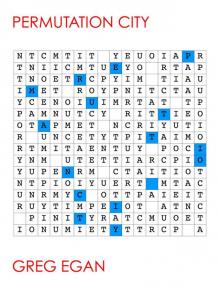 Permutation City
Permutation City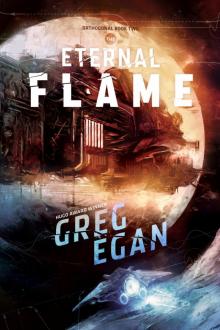 The Eternal Flame
The Eternal Flame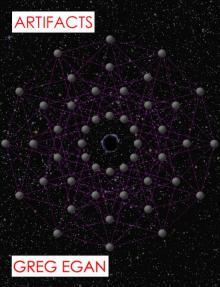 Artifacts
Artifacts Wang's Carpets
Wang's Carpets Dichronauts
Dichronauts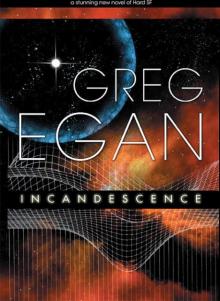 Incandescence
Incandescence Teranesia
Teranesia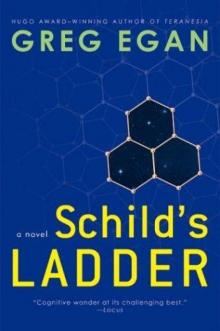 Schild's Ladder
Schild's Ladder Quarantine
Quarantine The Four Thousand, the Eight Hundred
The Four Thousand, the Eight Hundred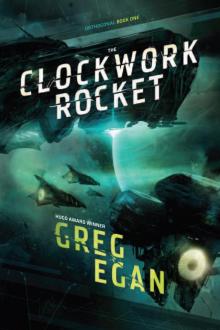 The Clockwork Rocket
The Clockwork Rocket Zeitgeber
Zeitgeber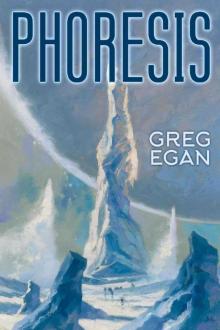 Phoresis
Phoresis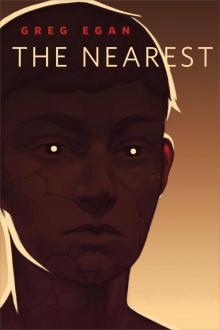 The Nearest
The Nearest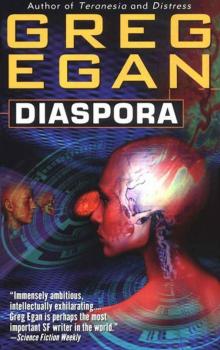 Diaspora
Diaspora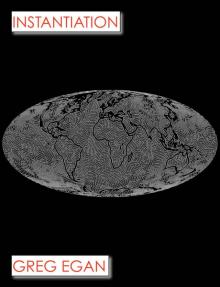 Instantiation
Instantiation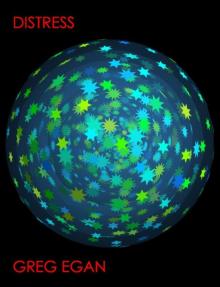 Distress
Distress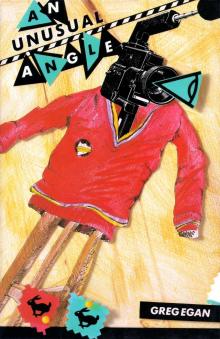 An Unusual Angle
An Unusual Angle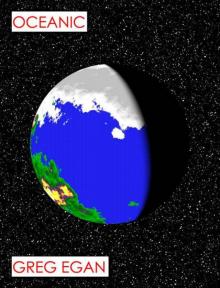 Oceanic
Oceanic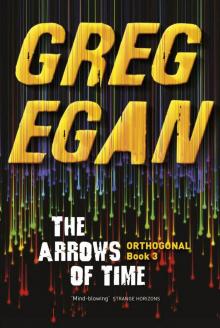 The Arrows of Time
The Arrows of Time Axiomatic
Axiomatic![Anthology 2. Luminous [1998, 2010] Read online](http://i1.bookreadfree.com/i/03/18/anthology_2_luminous_1998_2010_preview.jpg) Anthology 2. Luminous [1998, 2010]
Anthology 2. Luminous [1998, 2010]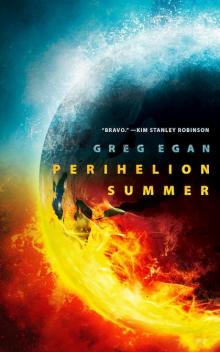 Perihelion Summer
Perihelion Summer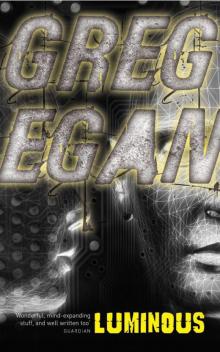 Luminous
Luminous